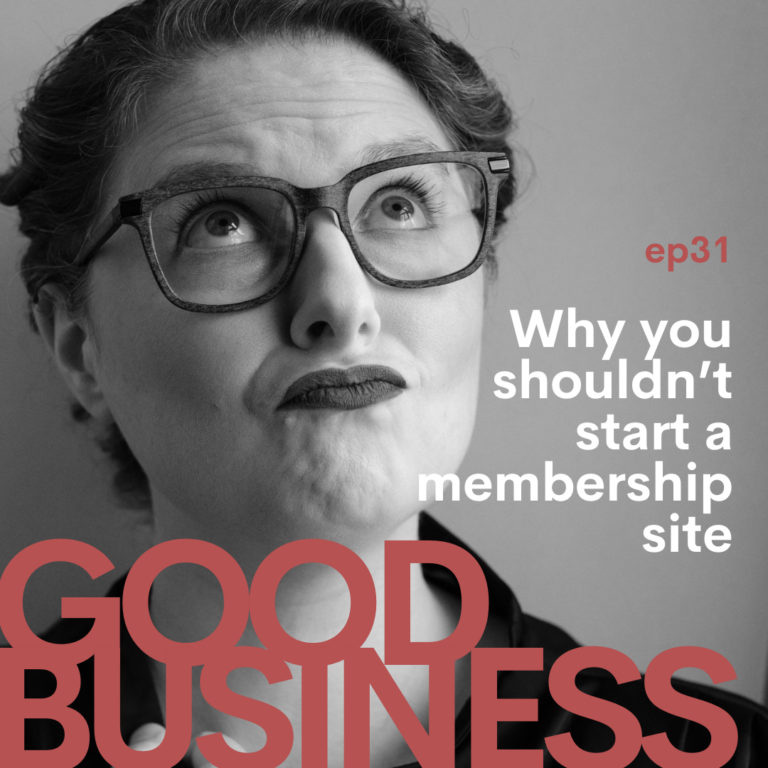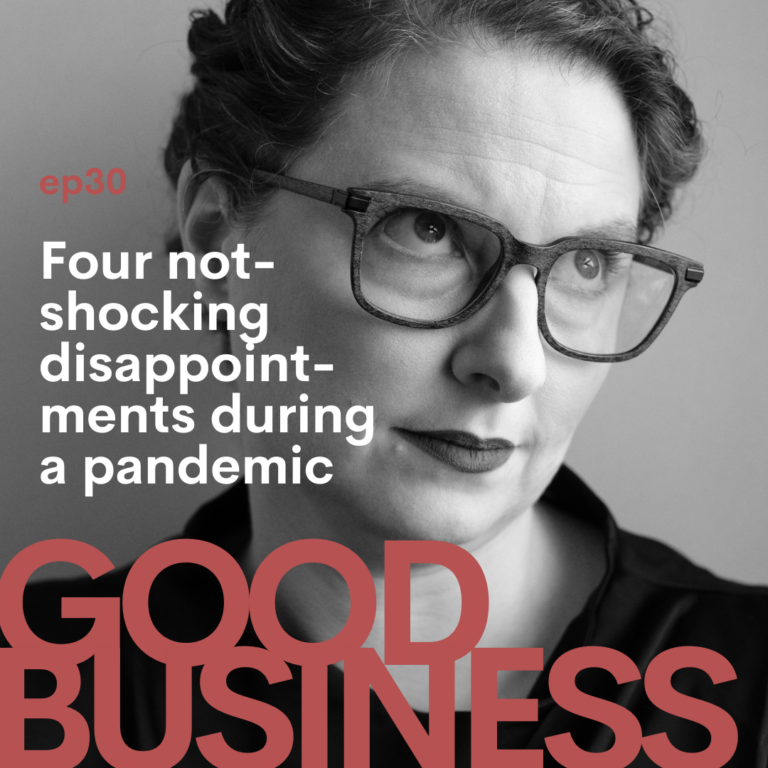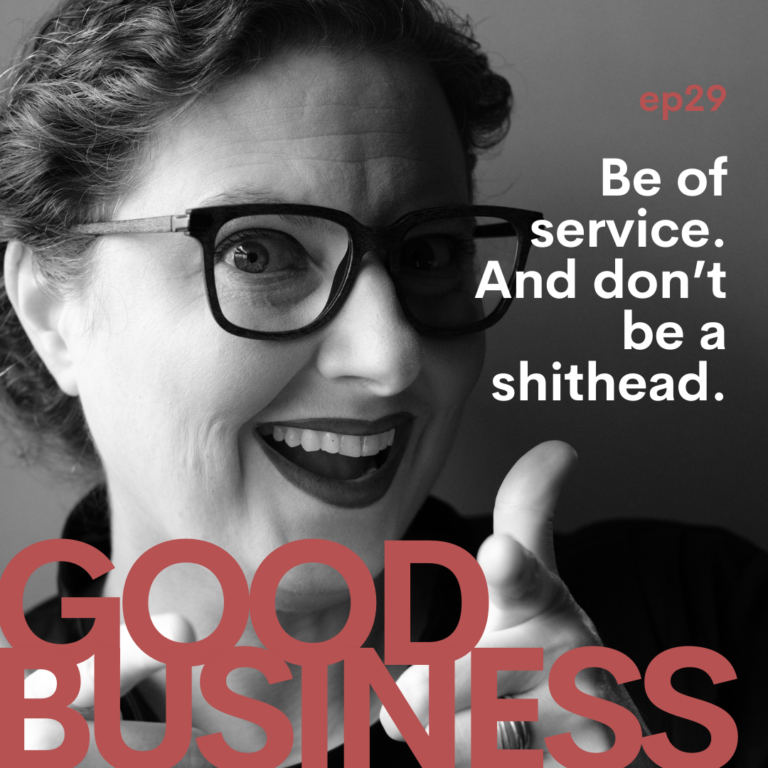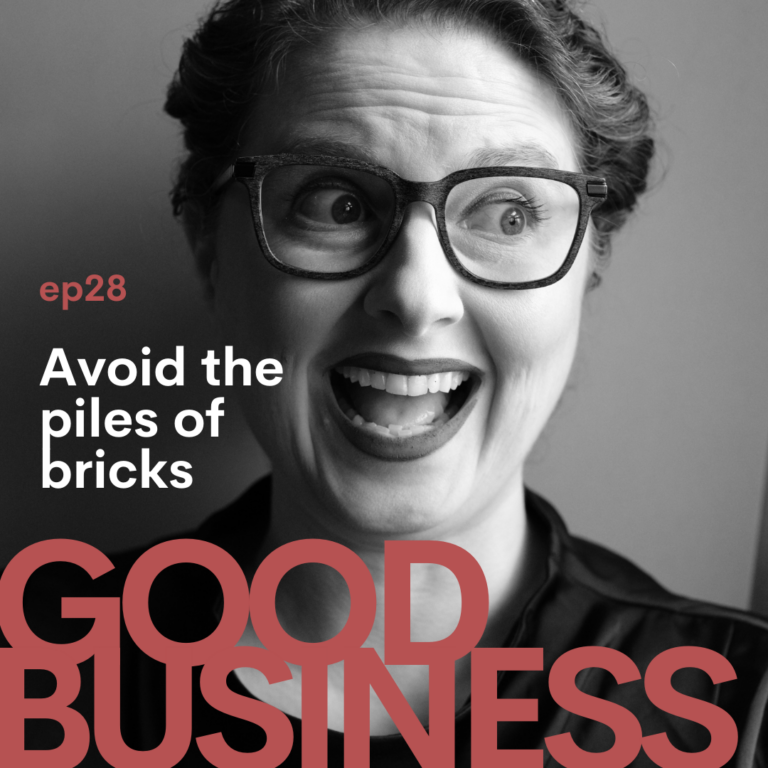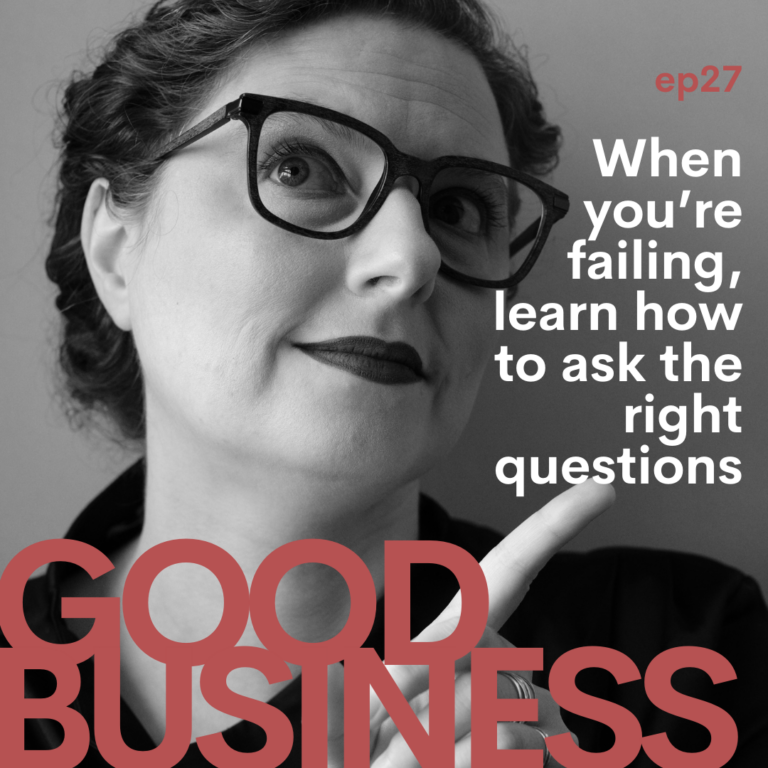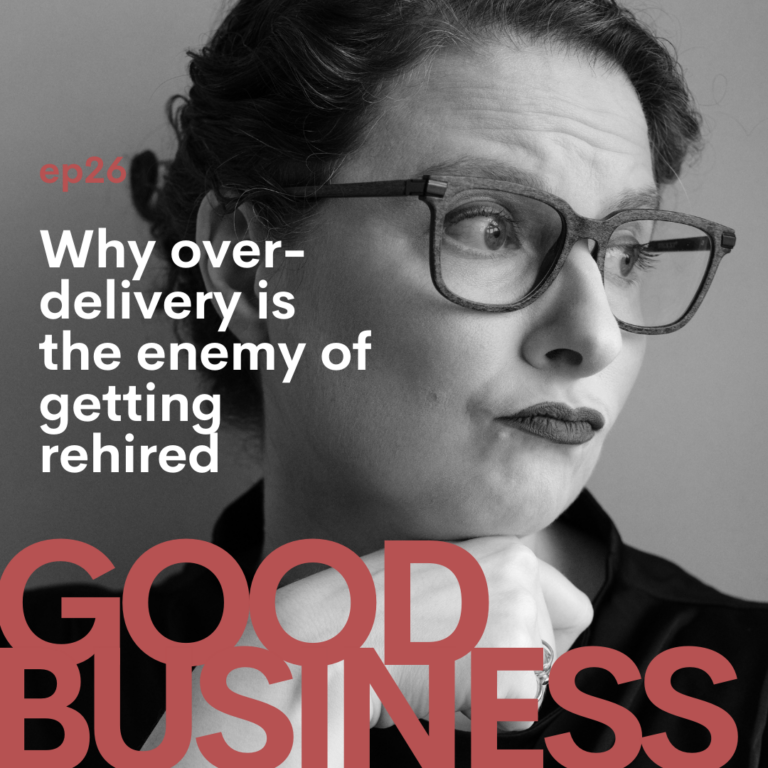Welcome back to the Good Business Podcast. I am your host, Illana Burk. And today, we’re talking about credibility. What is it? Why do you need it? And how do you establish it in the age of the internet when you can barely believe anything that anyone says that you find online, especially with deep fakes and AI and all the rest?
It’s getting harder and harder to know the bullshit from the real stuff. So what does credibility even really mean anymore? This topic came up for me this week because of a funny thing that happened over on TikTok where, as I have been talking about, I have a fairly new account that is growing relatively quickly, quicker than I actually expected it to.
Some dude on there asked me how many businesses I had successfully built and sold. Now, this is a question that I have been getting relatively frequently on TikTok that I actually am glad people are asking because it means that people actually care about being a little bit more discerning about who they’re listening to. Cause Oh my God, there’s just so much bullshit. Like I’m sorry. When you see somebody who’s like 22 and saying that they’re like a very experienced business coach. There’s literally not enough time for that to be true. So there’s a lot of that. A lot of, I did it so can you, a lot of just the, you know, fluffy bullshit.
So I’m glad that people are asking about credibility. He was, he did it in a rather confrontational way, like as, you know, anonymous people without profile pictures on TikTok have a tendency to do. And so I explained that I ran a digital agency for over a decade and I, you know, we ran 30 to 40 projects a year at its peak and it was, um, very busy and very thriving, and I made a conscious choice to close it, when I decided I wanted to focus more on education and coaching. And, instead of selling it, I chose to distribute my client list out to other designers in my community, because that was how I wanted to have that as my exit strategy. That was always my plan. And I still get residuals from some of those. So, it was very profitable for me to do it that way over time, and it supported my other community members. So obviously I wrote this in a very concise way because you only get like a certain number of characters in a TikTok comment, but I was very nice and like, just explained. And, um, his response was essentially saying like, well, Oh, really? Because there’s nothing on your LinkedIn about you owning a digital agency.
And so this guy like actually took the time to like, go search for my name on LinkedIn. And, and he was absolutely correct. LinkedIn has been basically like a professional parking lot for me for a really long time. It’s never been where my clients come from. So I don’t spend a lot of time there.
And my business has sort of evolved over time. So I guess I just didn’t really think of it as if like I own this and now I own this. It’s like, it’s always just been kind of an evolution. So it essentially looks like I’ve been this sort of mushy consultant for a really long time. And It was a really actually good point, like I just hadn’t seen it that way, because, so he just kept pushing and I kept explaining and then it just like escalated.
Because he was not going to let it go, it was like he was basically just saying that nobody should believe a thing that I say and I’m going man, you can like what I say or don’t like that’s, you know, kind of up to you, and then I remembered that the block button existed, and I decided that it was no longer worth my energy and time.
So that’s how that story ended.
But more importantly, I realized since he was right. I have spent the last decade or so essentially preaching to the choir on other platforms, on Facebook, on Instagram. My, I’ve never really focused on growing my reach. So the people that I spent my time conversing with and interacting with on social are mostly people I’ve known for a decade or more.
So we have a rapport. My credibility is pretty unassailable with them. Like we refer to each other, like everybody just kind of knows who I am. I’ve been around a long time and I never had to think about that. And I haven’t had to think about it for so long that I literally forgot to think about it. So, uh, so I went over to, um, to LinkedIn and I fixed my profile, obviously.
And the funny part was that, part of me thought the act of putting out more content was essentially the display of my credibility. Like that’s kind of why I started being on TikTok was like look, smart things on display. You know, here’s my credibility for all to see. And that it hadn’t really occurred to me that in order for people to actually buy what I’m saying, I also need to establish that I have the right to say it.
And that was my blind spot around this. So that’s why I’m bringing all this up today, because it made me really think about credibility from as a concept. And what it means and as, as you grow a business, like how that plays out. So what is credibility at its core? Essentially it’s one crucial piece of our ability to build trust quickly and establish our authority so that we can build things with followers, buyers, clients, and helpers.
But believe in us, right? It’s a way to help people believe in us, to help people buy what we’re selling both, logistically and metaphorically, right? For some, building a body of work, like books, writing, podcasts, heavy-duty social platforms, etc. Like that will be their credibility building.
That’s how they’re doing it, building long followings. They are consistently putting out content that says, I know what I’m talking about. Now for others, it will be a long career full of accomplishment, full of advancement. And for yet another group, it’s being chosen in some way by those who already have it. Right?
The anointed, you know, you get published in a big fancy book publisher or, um, another leader says this person’s amazing, you know, that’s how you get your credit. And sometimes it can happen very quickly. Sometimes it can take a really, really long time. But from the best I can tell, if you’re a professional content creator, who’s trying to really teach, you either need a lot of followers, or you need an established and verifiable career behind you that you can talk about in order to be credible right out the gate before you have all those followers.
And that’s a really hard thing to do for somebody who doesn’t have either one, right? That’s why building a business is so difficult, especially these days, because credibility can be faked. On one hand, you can build it quickly because you can fake it, you can buy followers, you can do all those things to deceive people, um, or you have to do it the hard way, which is slow and painful, you know, if you don’t have that like professional cred behind you of, you know, fancy letters after your name.
And even that only goes so far. So if you’re trying, you know, the other side of that is like, if you’re trying to build a career as a business owner who leads, you need a hearty content presence to bolster your ability to be taken seriously and open up opportunities. What I’m talking about is, let’s say you’re a business owner and, you know, you sell courses and workshops and, um, and all kinds of other things, you know, it doesn’t, it’s not limited to that.
But like, then you want to write a book. Well, in order to get the book deal, you need to have a big follower count. So it’s like these credibility pieces sort of work in opposite directions depending on what your goal is. So if you’re somebody who wants to just be a content creator, you’ve got to have all the professional cred.
But if you’re somebody who’s a business owner who wants to have new opportunities, then you have to become a content creator. So it just like goes back and forth. But that’s the way that content is really fueling credibility because it’s one of the only ways that we can all, we can kind of start to trust in individuals.
Because, you know, small business owners, it’s like, who’s going to take the time to deep fake my face, right? Like, you know, you can kind of believe us still. You can believe individuals on YouTube. Now, whether or not you should is a totally other thing, but you can just, you can at least make that discernment because they’re in front of you.
And that’s part of why video has become so important these days, because it’s much, much harder to fake with AI than audio is, frankly. I mean, I’ve seen podcasts that are done with AI now. Like, how depressing is that? So if you are trying to build something amazing, you have to produce content that’s equally amazing.
That’s kind of where the, you know, that’s where it lands. The moral of the story is that credibility is not just one thing, and it’s not the same thing for everyone, and the needs to build credibility are not the same for everyone, but we can all agree that we need it. So that’s where I landed after my story about credibility, and the action steps that you can take is take a look around at your digital footprint and see if you have any blind spots like I did.
You know, having orphaned or parking lot profiles out there could be hurting you more than you realize. Because this guy actually took the time to speak up. And it makes me wonder how many people went and looked at my LinkedIn page and didn’t say anything, right? And were just like, wow, she looks like she’s full of shit.
So I’m actively working on making sure that I don’t look like I’m full of shit. You know, I am updating my testimonials. I am getting recommendations that aren’t 15 years old because that was seriously how old my testimonials, my recommendations on LinkedIn were. So it’s time to bring everything up to the present so that people can actually see what I do, how I do it, why I know what I’m talking about.
So it’s time for you to go and do the same.
More Episodes
Why you shouldn’t start a membership site | GB31
Today's episode is all about how to look a little closer at the ever-growing trend of membership sites all over the place and how to know if you should jump on the bandwagon or not. Episode Transcript: I'm Illana Burk, CEO of...
Four not shocking disappointments in a time of crisis | GB30
Today’s episode is about the simple idea that your business exists not just to support you and your stakeholders, but to support your community.
Be of service and don’t be a sh*thead | GB29
Today's episode is all about how to not be a jerk in the middle of a crisis. Episode Transcript: I'm Illana Burk, CEO of Your Life's Workshop, coach to entrepreneurs and solopreneurs across dozens of industries and host of Good...
Avoid the piles of bricks | GB28
Today, we talk all about that craptastic feeling of being buried. Underwater. Crushed by the weight of big ideas, neverending task lists, and elephant-sized goals. First, we’ll talk about what this really means and the ways in which this feeling tends to show up, along with a little on how we tend to behave as a result. Then we’ll talk about a simple way to handle these moments better. And finally, we’ll wrap up with a healthy pep talk.
When you’re failing, learn how to ask the right questions | GB27
Today’s episode is all about how to not shoot yourself in the foot right out the gate. I’m gonna break down one very common mistake that newbies (and non-newbies) make and how to fix it. Today, we learn how to ask for help and guidance in a way that doesn’t completely fuck up your chances of getting what you ACTUALLY need, which is respect.
Why overdelivery is the enemy of getting rehired | GB26
Today’s episode is all about why over-delivering is a really good way to not get asked back for more work. We all think doing our best and giving more than people asked for is a good thing. And in some ways, it is. Things like adding extra value to something you do is fine. What I’m talking about is when you completely blow the scope of what was asked of you out of the water. It’s one of the hardest things to identify when you’re trying to figure out why no one seems to hire you twice.

